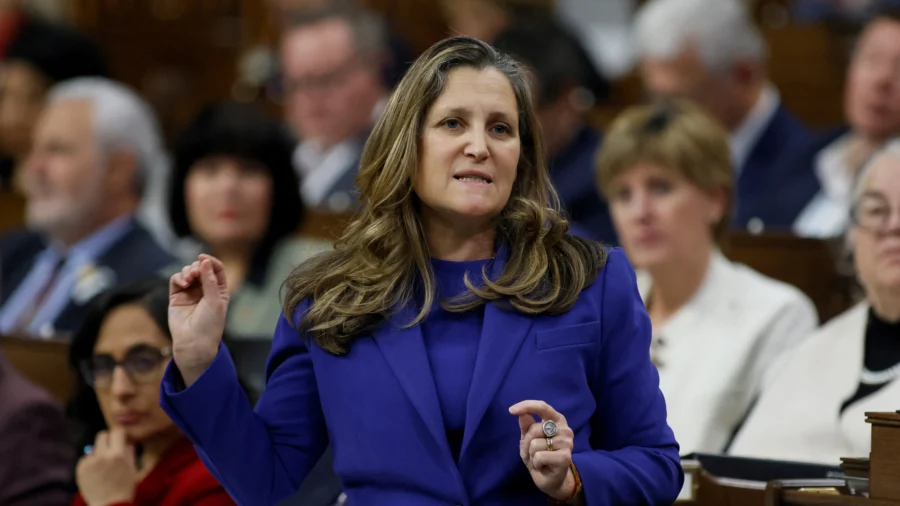OTTAWA—Canada’s Finance Minister Chrystia Freeland quit on Monday after clashing with Prime Minister Justin Trudeau on issues including how to handle possible U.S. tariffs.
In a stinging resignation letter, Freeland dismissed Trudeau’s push for increased spending as a political gimmick that could hurt Ottawa’s ability to deal with the 25 percent import tariffs U.S. President-elect Donald Trump says he will impose.
Freeland said she was quitting in the wake of a meeting last Friday with Trudeau, who asked her to take on a lesser post after the two had argued for weeks over spending.
Her resignation came just hours before she was due to present a fall economic update to parliament, a document widely expected to show the minority Liberal government had run up a much larger 2023/24 budget deficit than predicted. Officials said the document would be unveiled on Monday as planned.
Polls show the ruling Liberals, who have been in power since November 2015, are set to be crushed in an election that must be held by late October 2025.
Freeland, a former journalist, served as trade minister and then foreign minister before taking over the finance portfolio in August 2020. As minister, she oversaw the massive government spending campaign to deal with the damage done by COVID-19.
Domestic media reports said Freeland and Trudeau had clashed over a government proposal for temporary tax breaks and other spending measures.
“For the last number of weeks, you and I have found ourselves at odds over the best path forward for Canada,” Freeland said in a letter to Trudeau posted on X.
Freeland said the threat of new U.S. tariffs represented a grave threat.
“That means keeping our fiscal powder dry today, so we have the reserves we may need for a tariff war. That means eschewing costly political gimmicks, which we can ill afford,” she wrote.
When Trump came to power in 2017 he vowed to tear up the trilateral free trade treaty with Canada and Mexico. Freeland played a large role in helping renegotiate the pact and saving Canada’s economy, which is heavily reliant on the United States.
Although tensions between prime ministers and first ministers are not unusual—Trudeau’s first finance minister quit in 2020 in a clash over spending—the level of invective in Freeland’s letter was remarkable by Canadian standards.
“On Friday, you told me you no longer want me to serve as your Finance Minister and offered me another position in the Cabinet… you made clear that I no longer credibly enjoy that confidence and possess the authority that comes with it,” Freeland said.
“Upon reflection, I have concluded that the only honest and viable path is for me to resign from the Cabinet.”
Trudeau and Freeland officials did not reply to requests for comment as to what position she had been offered.
Freeland left the same day as Housing Minister Sean Fraser announced he was resigning for family reasons. Another six ministers have either already quit or announced they will not be running again in the next election.
Before entering politics in 2013, she worked as a journalist and in senior editorial roles with several media companies, including the Financial Times, the Globe and Mail, and Reuters News. where she worked from 2010 to 2013.
One potential replacement could be former Bank of Canada governor Mark Carney, who already serves as an economic advisor to Trudeau. Carney though is not a legislator and tradition dictates he would need to run for a seat in the House of Commons elected chamber.

